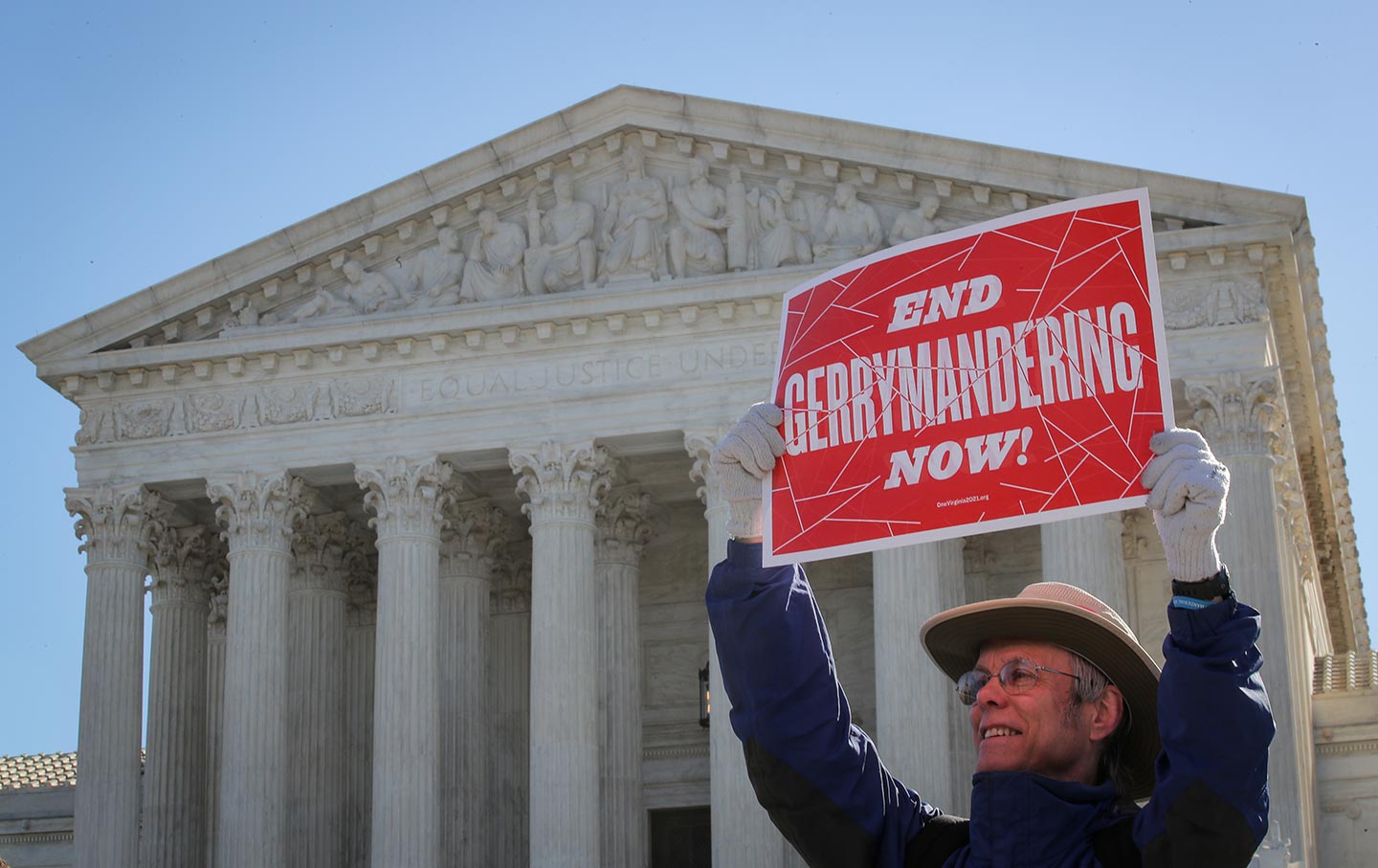With Another Government Shutdown Averted, the House Goes on Vacation
A stopgap funding bill passed on Wednesday, in spite of 82 “no” votes from Republicans. Then, Speaker Mike Johnson called a recess.

Speaker of the House Mike Johnson (R-LA) departs from a news conference with House Republican Caucus leadership at the Capitol on September 24, 2024, in Washington, DC.
(Anna Moneymaker / Getty Images)
It’s hard to think of any job where, having narrowly averted the same full-scale financial meltdown across five separate self-imposed deadlines, you’re rewarded with a generous block of vacation time. But that’s the new normal for the Republican majority in the 118th Congress. After yet another 11th-hour vote—by a lopsided 341–82 margin, with all the “no” votes from GOP members—to fund the government ended up relying on Democratic lawmakers to once more rescue the do-nothing GOP majority from its own dysfunction, House Speaker Mike Johnson released the House to go on recess until after Election Day. This, mind you, was after Johnson had abruptly gaveled House business to a halt for the balance of the summer in July, ahead of the chamber’s traditional August recess, when the Republican majority stalled out on that round of negotiations over a sustained spending deal. Whatever it is that House GOP members are doing with all this downtime, they’re clearly not hammering out a foundation for workable spending accords.
Of course, this time Republican lawmakers will mostly be spending their time away from the capitol seeking reelection—though it’s hard to imagine mobilizing much voter enthusiasm around messages like, Send me back to Congress so I can continue just barely meeting the minimum demands of my job, or, I haven’t broken the government yet.
Indeed, there’s a grim political irony in Johnson’s latest leadership humiliation. The speaker had tried to schedule a vote last week on a longer continuing resolution to fund the government through next March—but at the behest of former president Donald Trump, Johnson tethered that vote to the SAVE Act, another piece of MAGA-choreographed political theater that would have unleashed new crackdowns on ballot access to address the nonexistent plague of immigrant voter fraud. When the anti-government forces clustered around the Freedom Caucus once more throttled Johnson’s reveries of something resembling stable government funding, Trump urged the speaker to trigger a government shutdown, on the farcically mistaken theory that voters would somehow hold Democrats responsible for the ensuing chaos and deprivation.
Johnson, who—despite his own delusional view of his speakership as a divinely sanctioned mission—retains a fundamental grasp of political reality, rightly declared that forcing a shutdown on the eve of an election would be “political malpractice.” But that feint was also destined to split his coalition—the House Rules Committee scotched a bid for an open floor vote, which requires the motion to pass on a two-thirds majority. All of which left Johnson pinned to the same feeble dynamic that triggered his last spending deals—and the similar accord that doomed the speakership of his predecessor, former California Representative Kevin McCarthy: advance a clean continuing resolution, shorn of the red-meat riders to appease the GOP base, and rely on the Democrats to carry the deal across the finish line. The only rider on this package was an additional $231 million budgeted for the Secret Service, a measure that enjoyed clear bipartisan support.
The big problem with this harum-scarum approach, apart from its exhausting predictability, is that it locks in most of the Democrats’ own spending priorities, and thus does nothing to advance the cause of government shrinkage and budget discipline that the Freedom Caucus faithful profess to hold so dear. Then cue the next scripted round of outrage from the same unserious blowhards—and, quite possibly, a fresh motion to vacate the speakership; Johnson indeed narrowly skirted one such threatened vote at the behest of Georgia outrage merchant Marjorie Taylor Greene before Trump intervened on his behalf. (That’s right: The advocate of the burn-it-all-down shutdown strategy that would place Johnson’s narrow majority in imminent electoral peril is also the person to whom Johnson owes his thankless job. Republican legislative intrigue may be kryptonite to regular lawmaking order, but it’s clearly not immune to the laws of karma.)
Yesterday’s vote could also set the stage for a whole new set of perils for Johnson, thanks to the time frame of the continuing resolution: It runs for just three months—half the time Johnson was hoping for—and sets up a new spending deadline of December 20. That’s just over a month after the election, which introduces all sorts of new potential havoc for the speaker.
“If Republicans lose the House, and if Harris wins, I think there’s a very strong possibility that they say ‘fuck you,’ and do a shutdown over the holidays,” says longtime Congress watcher Norman Ornstein, an emeritus fellow with the American Enterprise Institute. That was the same time frame of the shutdown in 1995 engineered by then–House Speaker Newt Gingrich, and it was a huge political liability for the GOP in the next two election cycles. Yet if Johnson manages to talk the Freedom Caucus faction down from the ledge in this scenario, he could well be signing his own death warrant. “Let’s assume that Johnson at least prevails, and they don’t do a shutdown, on the basis of his argument that it would damage us,” Ornstein says. “His tenure as leader would then be short-lived.”
It’s the sort of immobilizing dilemma that would occur to an especially sadistic medieval torturer: avert a political calamity for your party at the expense of your own career. It’s the same calculation that sent Kevin McCarthy, a former “Young Gun” of the conservative movement, into early civilian retirement—and it scarcely suggests that a benevolent deity was the author of Johnson’s own tour as party leader. “I think he just mistook God for Beelzebub,” Ornstein says.
Disobey authoritarians, support The Nation
Over the past year you’ve read Nation writers like Elie Mystal, Kaveh Akbar, John Nichols, Joan Walsh, Bryce Covert, Dave Zirin, Jeet Heer, Michael T. Klare, Katha Pollitt, Amy Littlefield, Gregg Gonsalves, and Sasha Abramsky take on the Trump family’s corruption, set the record straight about Robert F. Kennedy Jr.’s catastrophic Make America Healthy Again movement, survey the fallout and human cost of the DOGE wrecking ball, anticipate the Supreme Court’s dangerous antidemocratic rulings, and amplify successful tactics of resistance on the streets and in Congress.
We publish these stories because when members of our communities are being abducted, household debt is climbing, and AI data centers are causing water and electricity shortages, we have a duty as journalists to do all we can to inform the public.
In 2026, our aim is to do more than ever before—but we need your support to make that happen.
Through December 31, a generous donor will match all donations up to $75,000. That means that your contribution will be doubled, dollar for dollar. If we hit the full match, we’ll be starting 2026 with $150,000 to invest in the stories that impact real people’s lives—the kinds of stories that billionaire-owned, corporate-backed outlets aren’t covering.
With your support, our team will publish major stories that the president and his allies won’t want you to read. We’ll cover the emerging military-tech industrial complex and matters of war, peace, and surveillance, as well as the affordability crisis, hunger, housing, healthcare, the environment, attacks on reproductive rights, and much more. At the same time, we’ll imagine alternatives to Trumpian rule and uplift efforts to create a better world, here and now.
While your gift has twice the impact, I’m asking you to support The Nation with a donation today. You’ll empower the journalists, editors, and fact-checkers best equipped to hold this authoritarian administration to account.
I hope you won’t miss this moment—donate to The Nation today.
Onward,
Katrina vanden Heuvel
Editor and publisher, The Nation








